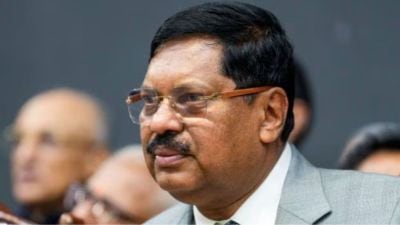‘No Opp alliance, but will join hands to defeat BJP’
• The CPI(M) is believed to have a definite set of ideologies on socio-economic policies. But during election time, senior party leader...

• The CPI(M) is believed to have a definite set of ideologies on socio-economic policies. But during election time, senior party leaders like Harkishan Singh Surjeet are busy negotiating with other Opposition parties. Wouldn’t such opportunistic alliances dilute your party’s ideology?
Nishant Ugal
Yes, the CPM is unequivocally committed to its ideological positions on socio-economic policies. Based on these commitments, the CPM decides its electoral tactics in order to advance these ideological positions. At a time when there is a serious danger posed to the very secular democratic republican character of India, the CPM would seek the cooperation of all parties who are willing to come together to thwart such a danger. There is therefore nothing ‘‘opportunistic’’ in such alliances that we may seek in the interests of the country.
• Considering the CPI(M)’s ideological differences with other opposition parties and the fact that the Congress is its main rival in West Bengal, Kerala and Tripura, do you think an Opposition alliance against the BJP and its allies is possible. Even if it is, do you think that such an alliance will stand the test of time?
Srinivas
The CPM’s unambiguous resolve is to work to defeat the communal forces in the coming elections. In order to achieve this, the CPM has categorically declared that there cannot be any alliance or a front with the Congress. This is because the economic policies pursued by the Congress and the compromising attitude towards the communal forces have been the cause for the rise of the communalism. Therefore, there is no question of a united Opposition alliance. However, the central objective of the alliance remains that of working for the defeat of the communal forces in the coming elections. Therefore with the Congress and all the other political forces who share this objective, the CPM will try to evolve suitable tactics to ensure that there is no division in the anti-communal votes, that will benefit the BJP.
• The need of the hour is a broad-based alliance against fundamentalism. But such an effort was not visible even during the Gujarat polls. Comment.
Krishnakumar
As said before, such a broad-based alliance however necessary and required, is not possible in the present circumstances but the effort to defeat fundamentalism is paramount. This is essential to preserve India as we know of it today. Unless we save India today, it won’t be around to be changed for the better tomorrow — and therefore the issues go beyond mere alliances between political parties, it needs a broad-based alliance of all Indian patriots today, to change it for the better tomorrow.
• Does your party have a definite vision for India rather than just opposing the ruling alliance for the sake of opposition alone?
Daleep Kashkari
Of course the CPM has a definite and defined vision for India. In fact we are the only ones who do! This can be encapsulated in the attempt to convert the political independence of our country into the true economic independence of our people. This was a task that remained unfulfilled at the time of India’s independence. The completion of this task is the CPM’s vision — a socialist India. An India with education and jobs for all, an India where the tiller of the land is its owner, an India where its population is its asset and not the burden, as is made out today. An India that celebrates its diversity rather than decrying it with medieval attempts to impose a uniformity. Our opposition to the ruling alliances is precisely because they prevent such a transformation, by maintaining the existing status quo, and therefore emerging as the biggest enemies of modernisation.
• When Jyoti Basu was offered the prime ministership, the party declined the opportunity. On retrospect, do you think that was indeeda ‘‘historic blunder’’ — one which resulted in a BJP-led government?
S. Saha
The question of Jyoti Basu accepting the offer of prime ministership was an issue of intense debate within the CPM. The 16th Congress of the CPM clinched the debate — endorsing the party’s stand. The CPM, with 33 MPs in Lok Sabha in a coalition that needed at least 272, would have been in no position to implement the policies that it advocates. It is on the basis of these policies that people voted for the CPM. Further, in such a coalition the CPM sitting in the driver’s seat would have had to implement many policies which it had vigorously opposed, and continues to do so. In either case, the CPM would have been betraying the people’s trust in it by its inability to implement what it wants, and being forced to implement what it does not want. In both cases, it would simply be a breach of trust. In any case, CPM’s decision was not the reason for the eventual emergence of a BJP-led government. The mid-term elections were forced on the country by the Congress when it withdrew its support to the United Front Government, despite its public pledge of supporting such a government for the full term.
• Is corruption an important issue for your party? If so, how does it dictate your choice of allies? Under the present circumstances, does the fight against casteism take a backseat to the fight against communalism?
Amarpreet Singh
Of course corruption is an important issue for us! Our track record is witness to our credibility. If you recollect, in the past a major corporate giant had set up a fund to help the political parties in a transparent manner. All parties including the CPM, according to their poll percentange, received cheques towards electoral expenses. The CPM was the only party to have returned the cheque with thanks. We believe that corporate funding of political parties feeds corruption.
Corruption during elections unfortunately does Not become an issue because among the major contenders, in most areas apart from the Left-dominated regions, people don’t see the difference. Corruption is an important issue for the people, but for this reason, it is not an electoral issue. As stated earlier, the CPM’s choice of allies is determined by its central objective, which in the present context is to save India from the onslaught of communal forces. The CPM continues its uncompromising fight against casteism while giving priority to defeating communalism.
Photos


- 01
- 02
- 03
- 04
- 05





























